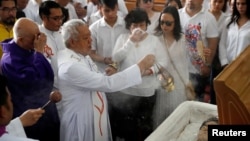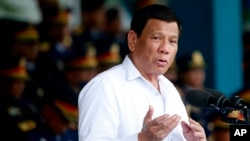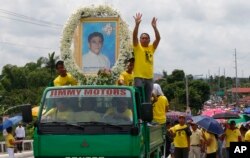Philippine President Rodrigo Duterte’s deadly anti-drug campaign has motivated people to gun down five mayors and deputy mayors since July, the latest casualties in a trend that has killed 15 local officials since 2016.
The latest rash of shootings began July 3 when the mayor of Tanauan City south of Manila died from a gunshot to the chest at a flag-raising ceremony. The mayor of General Tinio town on Luzon Island was gunned down by a motorcycle-riding sniper 24 hours later.
Gunmen shot the mayor of Ronda town near Cebu this week as he slept in his office. Assailants have shot to death two vice mayors over the same time span.
Fifteen local officials have been killed since Duterte took office in June 2016, domestic media outlet ABS-CBN News says.
People out to get these local officials may consider some easy targets because the central government lists the officials as suspects in the violent anti-drug campaign that began in 2016, experts in the country say. Those officials would have little control over local police, leaving them vulnerable to political opponents who in turn kill them with impunity.
“It’s very problematic that you can actually be shot inside the mayor’s office and that this is being linked with the drug war shows the degree of impunity that is prevailing here in the Philippines,” said Renato Reyes, secretary general of the Bagong Alyansang Makabaya alliance of social causes in Manila.
Spillover from anti-drug campaign
Duterte vowed before taking office in 2016 to eradicate drugs, including methamphetamines that he felt were hobbling the country. Rights groups believe he has authorized police to kill suspects without due process, inciting protests from foreign governments over the past two years.
The anti-drug campaign has killed 12,000 people, the New York-based advocacy group Human Rights Watch said in January.
Duterte’s administration publicizes lists of drug suspects as part of his crackdown, domestic media reports say. Assailants may be gunning down political opponents on those lists before local elections next year, said Eduardo Araral, associate professor at the National University of Singapore’s public policy school.
“It’s really difficult to parse out what is a clean target list, which one is a result of the drug war, which is one is a result of politics. It’s all mixed up,” Araral said. “The drug war has been going on before Duterte’s days, but the killings of politicians (have) intensified under Duterte.”
Ordinary Filipinos say they feel safer because of the anti-crime campaign that started after Duterte took office in June 2016. But the slaying of younger people linked to drugs prompted a public outcry in 2017. Duterte received a 65-point trust rating in the first quarter of 2018 from Metro Manila-based research institution Social Weather Stations, down from 75 points in 2017.
Other side of the war
Some assailants of Philippine mayors may also work in the drug trade, said Henelito Sevilla, assistant international relations professor at University of the Philippines. If drug dealers believe city officials are on Duterte’s side of the crackdown, he said, they may strike first to avoid being discovered.
“Local executives killed have strictly implemented the Duterte administration campaign against drugs and therefore, those who are involved in drug transactions would simply hire killers to do the dirty jobs for them to protect their drug business,” Sevilla said.
Local elections
More mayors could be shot before the elections to raise the odds for opposition candidates, experts fear. Filipinos will vote in May for local leaders nationwide and elect a new House of Representatives.
Local officials elsewhere in the Philippines hope to avoid being “too vocal in criticizing Duterte,” said Rhona Canoy, president of an international school and part of a political family on the southern island Mindanao.
The Philippine National Police chief said in July his force was doing everything possible after the assassinations that month, domestic media reported.
The central government will find it hard to head off more shootings unless it can control the flow of weapons, stop drugs from entering the country or use courts rather than on-the-spot killings to fight the illegal trade, analysts believe.
“The central government is reacting in a manner that is expected from it by the people after incidents happened, but government alone could not sufficiently resolve the issues related to killing and violence without a proactive participation of various stake holders particularly the local government unit as well as the people themselves,” Sevilla said.













